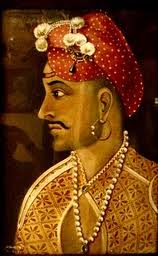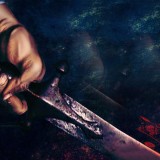On the afternoon of January 14th over fifty thousand men lay dead on the ancient battlefield staining the holy ground with their blood. Afghan and Indian Muslim lay locked in a deadly embrace with their arch enemies, the Hindu Marathas of the Deccan.
After six hours of desperate combat the Marathas were overwhelmed by the tide of numbers of their enemies and their lines broke in despair. Their commander Sadashiv Bhau lay dead on the field surrounded by the bodies of twenty Afghans eventually giving his life in the hour of defeat .The Muslim coalition of Afghans, Pathans, Rohillas, Awadhis were victorious and marched to Delhi to celebrate their victory.
The Maratha Empire lay shattered with the death of Sadashiv Bhau and Vishwas Rao swiftly followed by the death of the Peshwa himself in grief, Balaji Baji Rao. Any yet in the defeat lay the seeds of recovery and their eventual victory over the Muslims.
The desperate struggle against the pan Islamic coalition unaided by any of the other Hindus in the regions such as the Rajputs, or Jats their campaigning in far flung regions such as Punjab and the borders of Afghanistan thousand of miles from their Deccan homeland gave them a sense of pride and achievement not seen for a thousand years amongst the Hindus of India. The hoisting of the saffron flag, Bhagwa jhanda, in the fort of Attock in modern Pakistan’s’ border with the Afghans fulfilled the prophecy of their first king Shivaji the Great.
By 1772 they were back in Delhi defeating the Pathans and in revenge pulled down their tombs and monuments of victory even consigning the remains of Najib Khan to the fire after pulling it from his grave.The courage of the army in 1761 became as a legend to the Maratha warriors who followed. The fight to the death of 60,000 famished soldiers on starving mounts against 120,000 Afghans led by one of the best generals of the day,Ahmed Shah Abdali.
On the morning of January 14th after being besieged for over two months and facing imminent starvation the Maratha soldiers clamoured around the tent of their commander Sadashiv Bhau asking to be led in a final struggle as it was better to die fighting than of starvation. Their commander dipped their hands in henna and impressed them upon some parchment as a signal of their determination. The Marathas then lined up to face their foes, twice their number. The rest is best described by an eyewitness in the Afghan army quoting from his memoirs and the letters of Ahmed Shah Abdali himself,
[box_light]
“Across the centre of the Maratha army a huge saffron banner hung, and after the marching ceased and some discharge of cannon we saw the flashing of thousands of swords raised in defiance and a great battle cry arose from the ranks of the enemy – Har Har Mahadev. Suddenly in a tremendous rush they came at us in an irresistible charge with the ground shaking and the war cry of Har Har Mahadev ringing in our ears.Right through the centre of the army they broke through, the wild charge and courage of our enemies smashed through the ranks of the battle hardened Afghans sweeping all before their path On the right wing battalions of Telegus from South India were locked in shoulder to shoulder combat with the Pathans of Shah Pasand Khan. Despite being half their number the shorter dark skinned South Indians killed almost double the number of Muslim warriors in shoulder-to-shoulder combat raging for three hours. In this dark moment the reserves of the Afghan army, the camp followers and any man we could lay our hands on were sent into the battle to hold the breaking Afghan lines, many hundreds had taken the road to Kabul sensing defeat but were pushed back by the king’s bodyguards”.
[/box_light]
 Even then, hopelessly outnumbered and outgunned the Marathas fought on. The sky was darkened with arrows and shot as it fell among them but they did not yield the ground. Three times again under Sadashiv Bhau and the sixteen year old Vishwas Rao they rallied again under the giant saffron banner and charged again like a tidal wave of the ocean till the very ground disappeared in a hail of dust, blood and bodies where only the sounds of ‘Yah Ali’ and ‘Har Har Mahadev’ could be heard.
Even then, hopelessly outnumbered and outgunned the Marathas fought on. The sky was darkened with arrows and shot as it fell among them but they did not yield the ground. Three times again under Sadashiv Bhau and the sixteen year old Vishwas Rao they rallied again under the giant saffron banner and charged again like a tidal wave of the ocean till the very ground disappeared in a hail of dust, blood and bodies where only the sounds of ‘Yah Ali’ and ‘Har Har Mahadev’ could be heard.
The Afghans were still pressed back by the wild courage of their Maratha enemies until further allies’ came to reinforce the Afghan lines and push the Marathas back. Almost six hours of ferocious fighting had left the Marathas utterly drained but again they formed again and again under the saffron banner and came charging at us in a final attempt to secure victory, Before them all darted the Peshwas son, Vushwas Rao leading the attacked until just after three o clock he was shot through the temple and his body brought before the Bhau.
[box_light]”In that black moment the Bhau tasted the bitter dregs of defeat and knowing that he could not return to his home in Poona, a thousand miles distant with the dead body of the heir to the Maratha Empire. He dismounted from his mount along with his commanders and bodyguards and charged into the advancing mass of the Afghan army and was never seen alive again by any man. In the last moments with broken muskets, they kept fighting with spears and swords until these fell from their hand, they then fought with rocks and stones and eventually grappled us with their bare hands until death took them to the home of brave warriors”[/box_light]
The Abdali had won ! but at such a cost that he gave up his dream of a permanent Indian Empire forever. Another Maratha army was marching from the Deccan to continue the fight and after a brief stay in Delhi Abdali returned to Afghanistan.
A survivor from the lost field was Mahadji Sindhia, wounded for life and escaping after a perilous journey home he recovered and helped reform and refit the Maratha forces Sindhia, The kingmaker of India, marched victoriously into Delhi in 1772 and defeated the last Pathan rising in 1788 after slaying Ghulam Khan.
The recovery of the Marathas was complete after just ten years of the Panipat saga and it is said that in the last moments of Abdalis life he was informed that his arch foes were back in Delhi, mingling the call of death with the bitterness of eventual defeat after his repeated attacks on India. The powers of fanaticism and bigotry combined with utter mercilessness were repelled by the steadfastness and resolution of the Hindus of India, a tribute and reminder that freedom is never cheaply bought with confronted with the politics of ‘Terrorisation’..
Author: admin
(11506)
admin
Latest posts by admin (see all)
- The Ideals of the Kshatriya – Warrior - July 28, 2022
- Testing post to check FB comments - June 2, 2021
- Ramakrishna Paramahamsa : The Eternal Mystic - April 17, 2018
